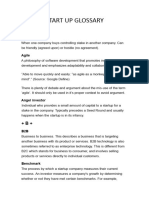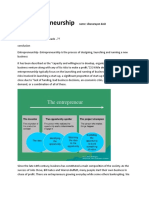0% found this document useful (0 votes)
16 views3 pagesStartups - Worksheet
The document discusses various aspects of startups, including challenges, successful examples, and key vocabulary related to starting a business. It poses questions for discussion and comprehension regarding business models, funding, and the importance of timing and team dynamics in startup success. Additionally, it includes a writing task for planning a startup using the business model canvas framework.
Uploaded by
Karolina A.Copyright
© © All Rights Reserved
We take content rights seriously. If you suspect this is your content, claim it here.
Available Formats
Download as PDF, TXT or read online on Scribd
0% found this document useful (0 votes)
16 views3 pagesStartups - Worksheet
The document discusses various aspects of startups, including challenges, successful examples, and key vocabulary related to starting a business. It poses questions for discussion and comprehension regarding business models, funding, and the importance of timing and team dynamics in startup success. Additionally, it includes a writing task for planning a startup using the business model canvas framework.
Uploaded by
Karolina A.Copyright
© © All Rights Reserved
We take content rights seriously. If you suspect this is your content, claim it here.
Available Formats
Download as PDF, TXT or read online on Scribd
/ 3





















































































































